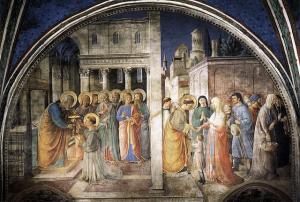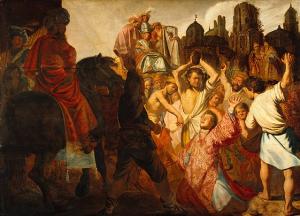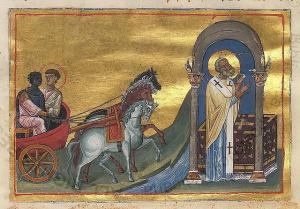This is the second post in a short series on the book of Acts, was written by a Christian colleague (JAG) who teaches in the School of Social Work. Both his professional expertise and his personal experience as a second generation immigrant shape his understanding of the book and bring insights that will help all of us read the book better. He presented the material in a well received class at our church and I am pleased to bring it here as well. RJS
The Seven Deacons develop their skills for communicating with diverse constituencies within the church, then extend the church’s outreach beyond Jerusalem (Acts 6-15).
A Personal Re-introduction: Triple Consciousness and Conflict?
 Acts 6:1 identifies a conflict: “There arose a dispute between the Greek-speaking Jews and the Hebrew-speaking Jews.” In my previous post, diversity within the church originates with the Jewish Diaspora. In this post, triple consciousness is activated in the membership, and benefits both the body and its outreach.
Acts 6:1 identifies a conflict: “There arose a dispute between the Greek-speaking Jews and the Hebrew-speaking Jews.” In my previous post, diversity within the church originates with the Jewish Diaspora. In this post, triple consciousness is activated in the membership, and benefits both the body and its outreach.
I am no stranger to disputes regarding language and residence. In the US, “Fresh Off the Boat” (sometimes shortened to FOB or modified to FOP for “Fresh Off the Plane”) is not just a television show about a Chinese American family. It is also a term used to ridicule recent immigrants’ blundering attempts to adjust to a new culture, a slur I confess to have used more than once.
As a teenager, I visited my Grandfather’s house on Manila Bay. He introduced me to his friends. Their conversation was in Taglish, a mix of English and Tagalog, and slow enough for me to follow along.
“Balikbayan?”
Usually this referred to a first-generation immigrant returning home. The Balikbayan box industry has flourished, enabling homecoming children of the archipelago to ship their expected gifts to welcoming family and friends.
“No. I was born in America.”
The conversation sped up and shifted entirely to Tagalog. I asked them to please slow down and use more English.
“Balikbayan? Bah! You are an American tourist!”
Returning to the text, the Seven Deacons needed to move back and forth between Hebrew and Greek, switching languages and cultural frames of references – not a simple task. The church at Pentecost numbered 3000 (Acts 2:41) but is now over 5000 (Acts 4:4). Is there a common word for bread? Luke lists multiple languages spoken and places of residence in Acts 2:9-11. Is there a recipe for bread that will satisfy everyone’s tastes? Who eats first and in what order? What is the process for making and enforcing even that simple decision? Which language does the congregation pray in before the meal? And as Paul notes in 1 Corinthians 14:16, without an interpreter, how will the congregation even know when to say Amen?
The apostles are devoted to teaching the word. Perhaps it is also true they are ill-suited to this task. Witnesses at Pentecost ask, “Are not these men all Galileans?” – a comment on that location’s reputation for somewhat limited linguistic capabilities. Remember, too, when Peter denied Jesus:
“Surely you are one of them; your accent gives you away.” (Matthew 26:73b)
What Activates the Seven Deacons’ Triple Consciousness?
Service. Specifically, they oversee meals for the church, especially the widows: “This proposal pleased the whole group” (Acts 6:5a). In Social Work, there is much discussion about praxis – what is the relationship of practice to theory? Here, could the Deacon’s practice inform the later writings (or theory) of New Testament authors?
James, for example, is the leader of the Jerusalem church in Acts 15. Could he be an observer here, later drawing on the Deacons’ example to exhort believers to be quick to hear, slow to speak (since translation for 5000 does take time!) and slow to anger (James 1:19)? Could this service to widows be the inspiration for James 1:27?
Religion that God our Father accepts as pure and faultless is this: to look after orphans and widows in their distress and to keep oneself from being polluted by the world.
Paul, although not present, could also be drawing on this example when he writes in Galatians 3:28.
There is neither Jew nor Gentile, neither slave nor free, nor is there male and female, for you are all one in Christ Jesus.
I remind Social Work students that diversity is not just identifying and understanding differences between and within social groups – you must also learn the skills and competencies to communicate across these differences. In that literature, the focus tends to be on race/ethnicity, gender, and socioeconomic class. The Deacons’ ministry bridges all three social boundaries.
Widows are obviously female and there appears to be a communication gap between them and the church leadership. All the apostles and Deacons are male. Widows are also poor and marginalized in the Roman Empire, but in the church they worship alongside much richer believers. Barnabas, for example, was a landowner. Today, the sisters of Lazarus, Martha and Mary (John 12:1-8), would be wealthy donors.
Finally, in his epistles, Paul often interchanges Greek with Gentile – Jew and non-Jew – to indicate how some early Christians expressed ethnicity. My point here is that the Deacons’ ability to move between languages and cultures activates a triple consciousness that also allows them to work across the social boundaries of race/ethnicity, gender, and socioeconomic class, both within and, as we will see shortly, outside the church.
Stephen’s Insight at the Synagogue of the Freedmen
 Acts 7 is Stephen’s tour-de-force of the Old Testament but, for the purposes of this post, we will unpack only one key phrase:
Acts 7 is Stephen’s tour-de-force of the Old Testament but, for the purposes of this post, we will unpack only one key phrase:
“However, the Most High does not live in houses made by human hands.” (Acts 7:48)
The brilliance of this theological paradigm shift cannot be understated. It is apparent to a Jew of the Diaspora like Stephen, or later, Paul, that their worship of God after the resurrection is equally valid in Jerusalem – or Antioch or Tarsus. However, this insight is not apparent to the Freedmen. History notes their commitment to the areas surrounding Jerusalem came at a high price and was a source of great pride. This is one of the precipitating factors in Stephen’s martyrdom. Paul, at that time Saul, is present at Stephen’s stoning (Acts 7:58) and later will carry this message to a new audience.
I often wonder how clear Stephen’s insight was to the apostles. Only they remain in Jerusalem after his martyrdom (Acts 8:1). When did they stop worshipping daily in the Temple courts (Acts 5:42)?
Philip’s Evangelism in Samaria
 Philip evangelizes Samaria, not the apostles. This is despite Jesus’ direct command to be his witnesses in “Judea and Samaria” (Acts 1:8), his meeting with the woman at the well (John 4:1-42), and his Parable of the Good Samaritan (Luke 10:25-37).
Philip evangelizes Samaria, not the apostles. This is despite Jesus’ direct command to be his witnesses in “Judea and Samaria” (Acts 1:8), his meeting with the woman at the well (John 4:1-42), and his Parable of the Good Samaritan (Luke 10:25-37).
The enmity between the Jews and the Samaritans stemmed from the question of intermarriage. Samaritans were Jews who married Gentiles, somehow creating an inferior race. To Philip, however, with an activated triple consciousness, this old line of thinking raises a critical question: How is the Samaritan mix of Jewish and Gentile cultures any different than either side in the conflict between Greek-speaking and Hebrew-speaking Jews, or Philip’s own experience as a Jew of the Diaspora?
My reading is that Philip sees these differences between groups as differences in degree and not kind, continuous and not discrete. And to my earlier advice about diversity, Philip does not just identify and understand these differences, he has developed the skills and competencies to communicate across them – which he piloted in Jerusalem while serving meals.
Philip’s success as an evangelist raises another question: Who is the first Gentile convert? Traditionally the answer is Cornelius, in Acts 10:23-48, yet how does Cornelius differ from the Ethiopian eunuch, in Acts 8:25-40? What are we to make of the text that those scattered by the persecution of Stephen began preaching the Word to Jews and Greeks alike? This is hinted at in Acts 8:4 but made explicit in Acts 11:19-21.
Now those who had been scattered by the persecution that broke out when Stephen was killed traveled as far as Phoenicia, Cyprus and Antioch, spreading the word only among Jews. Some of them, however, men from Cyprus and Cyrene, went to Antioch and began to speak to Greeks also, telling them the good news about the Lord Jesus. The Lord’s hand was with them, and a great number of people believed and turned to the Lord.
As with Stephen and the Freedmen, what is apparent to the second generation is hidden from the first – until it is revealed by the Holy Spirit. This is an important point since Peter recounts his vision three times between Acts 10 and 15. While I have emphasized my personal and professional approaches to the text, it is the Holy Spirit who edifies the church with methods that are creative and varied. Sometimes the intervention is dramatic – Pentecost’s the gift of tongues, Paul’s conversion, and Peter’s vision. Other times, the processes are mundane – Deacons waiting on tables or James presiding over a church business meeting, ultimately affirming the outreach to the Gentiles.
Questions for Reflection:
Are you engaged in service?
- How could your service be enhanced by including multiple perspectives, including racial/ethnic, gender, and/or socioeconomic class diversity?
- What skills or competencies could improve your service to diverse groups?
- How, where or with whom might you develop these competencies or skills?
If you wish to contact me directly you may do so at rjs4mail [at] att.net.
If interested you can subscribe to a full text feed of my posts at Musings on Science and Theology.











